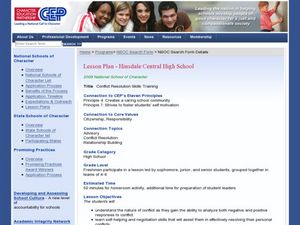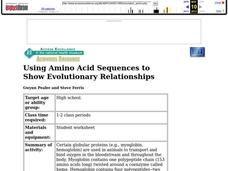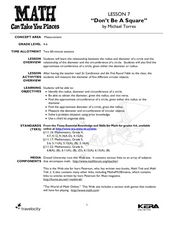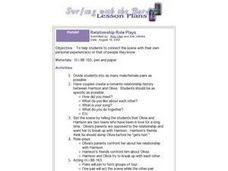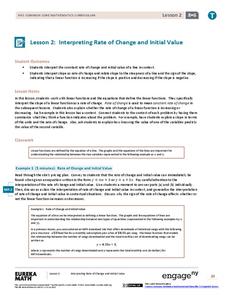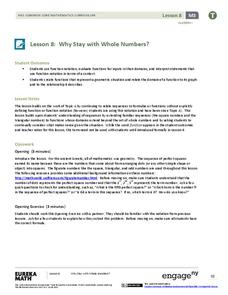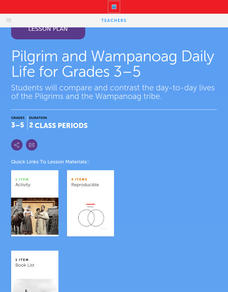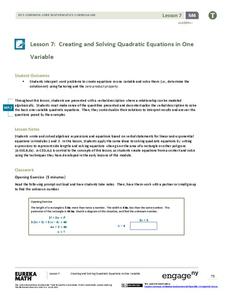California Department of Education
Studying for Careers
How can good study habits set someone up for a successful career? Learners explore the relationship between study skills and job skills in the fourth installment of a five-part college and career readiness lesson plan series. The group...
Teach Engineering
Global Climate Change
The greenhouse effect and its relationship to global warming is the focus of an activity that asks class member to consider the effects of climate change on weather. Pupils work with their families to determine their carbon...
PBS
Dear Pen Pal
Explore cultures from around the world with an engaging pen pal resource. Through a series of classroom activities and written correspondence, children learn about the favoritec pastimes, schooling, geography, and weather that is...
ProCon
Video Games and Violence
Is screen time dangerous time? Scholars take a close look at the facts surrounding video games and violence. Pros give evidence connecting violence to video games while cons suggest there is no relationship.
Curated OER
Conflict Resolution Skills Training
Students complete conflict resolution skills training as a part of creating a caring school community. In this conflict resolution activity, students work with a group of peer student leaders to resolve conflicts. Students visit freshman...
Curated OER
Using Amino Acid Sequences to Show Evolutionary Relationships
Compare protein fragments, count amino acids, and use the information to explore common ancestry. The resource mentions a student worksheet, however, a separate printable worksheet is not provided. The exercises are written into the...
Curated OER
How Big Is That Star?
Aspiring astronomers study stars. They compare stars and explain the relationship between radius, mass, and diameter. By creating a star simulation, they discover how a binary star system's orbit can cause changes in the observed...
Curated OER
Friar Margil and the Spanish Missions
Students examine the concepts of diversity and assimilation. They identify the validity of sources and recognize bias, and create original illustrations from the students' point of view which show the impact of the Spanish friars on the...
Curated OER
Don't Be a Square
Students analyze the relationship between radius and diameter. Students read Sir Cumference and the First Round Table then take measurements of circular items from around the room. Students compute the radius, diameter...
Curated OER
Earth Science: The Sun-Earth Relationship
Students examine the sun's impact on the Earth. They read online articles, explore various websites, and answer questions using information found on the Internet.
Curated OER
Relationship Role Plays
Students connect a scene from a play they are reading to events in their own lives. Working in male/female pairs, students act out a scene from "Hamlet." Pairs work to role play a scene as an extension of the one they have read, using...
Curated OER
A Hands-On Paper Activity Examining The Relationship Between Hierarchical Levels Of Structure And Function
Learners investigate how complex functions arise in biological systems through the creation of several paper structures to accomplish various tasks such as remaining suspended in air for the longest time, making the loudest noise and...
Curated OER
Hierarchical Organization in Biology: Students Presentations of Neurobiology
Students gather (research) information on neuron structure and action potential. Students are guided to make inferences about the synapse and its relationship to neurotransmitter release and action. They are also guided to make...
Curated OER
Watching the Clock: An activity to build media-savvy students
Students analyze time constraints on broadcast news. They apply data collecting and data display skills. They identify the difference between news progams and the evening news.
EngageNY
Interpreting Rate of Change and Initial Value
Building on knowledge from the previous lesson, the second lesson in this unit teaches scholars to identify and interpret rate of change and initial value of a linear function in context. They investigate how slope expresses the...
EngageNY
Why Stay with Whole Numbers?
Domain can be a tricky topic, especially when you relate it to context, but here is a lesson that provides concrete examples of discrete situations and those that are continuous. It also addresses where the input values should begin and...
Curriculum Corner
RTI- Student Snapshot
Record a learner's strengths, as well as concerns and parent input, on this handy RTI form.
EngageNY
Construct a Perpendicular Bisector
How hard can it be to split something in half? Learners investigate how previously learned concepts from angle bisectors can be used to develop ways to construct perpendicular bisectors. The resource also covers constructing a...
Scholastic
Pilgrim and Wampanoag Daily Life for Grades 3-5
Thirteen steps make up a lesson plan that challenges pupils to compare and contrast the daily lives of Pilgrims and the Wampanoag tribe. Learners revisit the Graffiti Wall then break into small groups for an investigative reading...
EngageNY
Creating and Solving Quadratic Equations in One Variable
Give your classes practice at modeling using quadratic models with a resource that uses area and integer problems to allow individuals to create second degree polynomials. Young mathematicians solve equations using factoring and then...
Illustrative Mathematics
Gotham City Taxis
Taxi! Have your travelers figure out how far they can go in a taxi for $10.00. They must account for the mileage rate and tip in their calculation. They can set up a table or make an equation to solve for the exact mileage they can...
Illustrative Mathematics
Sale!
Everyone loves a sale, and this worksheet allows learners to calculate which sale is more rewarding. The activity can be adapted for different thinking contexts. The answer key describes different answer choices, some being higher...
Colorado State University
If Hot Air Rises, Why Is it Cold in the Mountains?
Investigate the relationship between temperature and pressure. Learners change the pressure of a sample of air and monitor its temperature. They learn that as air decreases its pressure, its thermal energy converts to kinetic energy.
Radford University
I Want to Rock!
Find the best deal on music. Small groups create playlists of music and determine the cost based on different pricing structures. They determine whether the pricing structure represents a direct or inverse variation relationship by...






